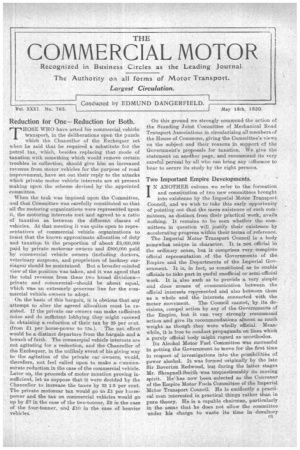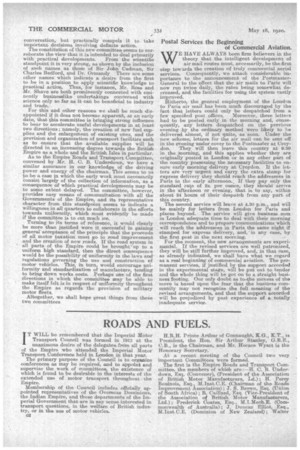Reduction for One— Reduction for Both.
Page 1

Page 2

If you've noticed an error in this article please click here to report it so we can fix it.
THOSE WHO have acted for commercial vehicle transport, in the deliberations upon the puz-zle which the Chancellor of the Exchequer set when he said that he required a substitute for the petrol tax, which, besides replacing that mode of taxation with something which would remove certain troubles in collection, should give him an increased revenue from motor vehicles for the purpose of road improvement, have set out their reply to the atta.cks which private motor vehicle interests are at present making upon the scheme devised by the appointed committee.
When the task was imposed upon the Committee, and that Committee was carefully constituted so that all the motoring organizations were represented upon It, the motoring interests met and agreed to a ratio of taxation as between the different classes of vehicles. At that meeting it was quite open to representatives of commercial vehicle organizations to insist that the known approximate allocatiOn of duty and taxation in the proportion of about 23,000,000 paid by private motorcar owners and 2800,000 paid by commercial vehicle owners (including doctors, veterinary surgeons, and proprietors of hackney carriages) should be maintained. But a broader-minded view of the position was taken, and it was ageed that the total revenue from these two broad divisions— private and commercial—should be about equal, which was an extremely generous line for the commercial vehicle owners to adopt.
On the basis of this bargain, it is obvious that any attempt to alter the agreed allocAion must be resisted, If the private car owners can make sufficient noise and do sufficient lobbying they might succeed in obtaining a reduction of their tax by 25 per cent. (from £1 per horse-power to 15s.). The net effect would be a distinct departure from the bargain and a, breach of faith. The commercial vehicle interests are not agitating for a reduction, and the Chancellor of the Exchequer, in the unlikely event of his giving way to the agitation of the private ear owners, would, therefore, not feel called upon to make a. commensurate reduction in the case of the commercial vehicle. Later on, the proceeds of motor taxation proving insufficient, let us suppose that it were decided by the Chancellor to increase the taxes by 33 1-3 per cent. The private motorcar tax would go to 21 per horsepower and the tax on commercial vehicles would go up by 27 in the case of the two-tonner, £9 in the case of the four-tonner, and 210 in the case of heavier vehicles. On this ground we strongly commend the action of the Standing Joint Committee of Mechanical Road Transport Associations in circularizing all members of the House of Commons, giving the Committee's views on the subject and their reasons in support cf the Government's proposals for taxation. We give the statement on another page, and recommend its very careful perusal by all who can bring any influence to bear to secure its study by the right persons.
Two Important Empire Developments.
IN ANOTHER column we refer to the formation and constitution of two new committees brought into existence by the Imperial Motor Transport Council, and we wish to take this early opportunity of pointing out that the mere existence of such committees, as distinct from their practical work, avails nothing. It remains to be seen whether the committees in questiOn will justify their existence by accelerating progress within their terms of reference.
The Imperial Motor Transport Council is a body somewhat unique in character. It is not official in the ordinary sense, but it comprises very complete official repres,entation of the Governments of the Empire and the Departments of the Imperial Government. It is, in fact, so constitutedas to enable officials to take part in useful unofficial or semi-official work. It is also such as to provide -a very simple and close means of communication between the official interests represented and also between them as a whole and the interests connected with the motor movement. The Council cannot, by its decisions, compel action by any of the Governments of the Empire, but it can very strongly recommend action and give its recommendations almost as much weight as though they were wholly official. Meanwhile, it is free to conduct propaganda on lines which a purely official body might regard as unorthodox. Its Alcohol Motor Fuel Committee was successful in getting the Government to Move for the first time in respect of investigations into the possibilities of power alcohol. It was formed originally by the late Sir Boverton Redwood, but during the latter stages Mr. Shrapnell-Smith was unquestionably its moving spirit. He' has now been selected as the Convener of the Empire Motor Fuels Committee of the Imperial MaskTransport Council. He is eminently a practical man interested in practical things rather than in pure theory. He is a capable chairman, particularly in the sense that he does not allow the committee under his charge to waste its time in desultory
conversation, but practically compels it to take important decisions involving definite action. The constitution of this new committee seems to corroborate the view that it is intended to deal primarily with practical developments. From the scientific standpoint it is very strong, as shown by the inclusion of such names as thoe of Sir John Cadman, Sir Charles Bedford, and Dr. Ormandy There are some other names which indicate a desire from the first, to be in a position to apply scientific knowledge to practical action. Thus, for instance, Mr. Ross and Mr. Shave are both prominently connected with eminently businesslike undertakings concerned with science only so far as it can be beneficial to industry and trade.
For this and other reasons we shall be much disappointed if it does not become apparent, at an early date, that this committee is bringing strong influence to bear to accelerate useful developments in at least two directions ; namely, the creation of new fuel supplies and the enlargement of existing ones, and the provision and organization of transport facilities such as to ensure that the available supplies will be directed in an increasing degree towards the British Empire as a whole and the British. Isles in particular.
As to the Empire -Roads and Transport Committee, convened by Mr. H. C. B. Underdown, we have a similar assurance in our knowledge of the driving power and energy of the chairman. This seems to us to be a case in which the early work must necessarily consist largely of the collection of information, as a consequence of which practical developments may be to some extent delayed. The committee, however, provides easy means of communibation with all the Governments of the Empire, and its representative character from this standpoint seems to indicate a willingness in all quarters to collaborate in the efforts towards uniformity, which must evidently be made if the committee is to out much ice.
Turning to its terms of reference, it would clearly be more than justified were it successful in gaining general acceptance of the principle that the proceeds of all motor taxation must go to road improvement and the creation of new roads. If the road system in all p-arts of the Empire could be brought-up to a uniform high standard, then the direct consequence would be the possibility of uniformity in the laws and regulations governing the use and construction of motor vehicles. This, in turn, would encourage uniformity and standardization of manufacture, tending to bring down works costs. Perhaps one of the first directions in which the committee may be able to make itself felt is in respect of uniformity throughout the Empire as regards the provision of military motor fleets.
Altogether, we shall hope great things from these two committees
Postal Services the Beginning of Commercial Aviation.
WE HAVE ALWAYS been firm believers in the theory that the intelligent development of air mail routes must, necessarily, be the first step towards the creation of truly commercial aerial services. Consequently, we attach considerable importance to the announcement of the PostmasterGeneral to the effect that the air mails to Paris will now run twice daily, the rates being somewhat decreased, and the facilities for using the system vastly improved.
Hitherto, the general employment of the London to Paris ear mail has been much discouraged by the fact that letters could only be despatched from a few specified post offices. Moreover, these letters had to be posted early in the morning and, consequently, any letters despatched on the previous evening by the ordinary method were likely to be delivered almost, if not quite, as soon. Under the new scheme, letters for the air mail can be sent off in the evening under cover to the Postmaster at Croy don. They will then leave this country at 9.30 in the morning, and this applies whether they are originally posted in London or in any other part of the country possessing the necessary facilities to ensure early morning delivery at Croydon. If the letters are very urgent and carry the extra stamp for express delivery they should reach the addressees in Paris in the early afternoon., If they pay only the standard rate of 2s. per ounce they should arrive in the afternoon or evening, that is to say, within about 24 hours of their despatch from any part of this country.
The second service will leave at 4.30 p.m., and will be mainly for letters from London for Paris and places beyond. The service will give business men in London adequate time to deal with their morning correspondence and to prepare communications which will reach the addressees in Paris the same night if stamped for express delivery, and, in any case, by
the first post in the next morning. -
For the moment, the now arrangements are experimental. rf the revised services are well patronized, they will be still further improved, and, in that case, as already indicated, we shall have what we regard as a real beginning of commercial aviation. The permanent services, if justified by the support accorded in the experimental stage, will be put out to tender and the whole thing will be got on to a Straight business footing. Our only doubt as to-the success of the move is based upon the fear that the business community may not recognize the full meaning of the revised arrangements,, and that the support accorded will be prejudiced by past experience of a totally, inadequate service.




























